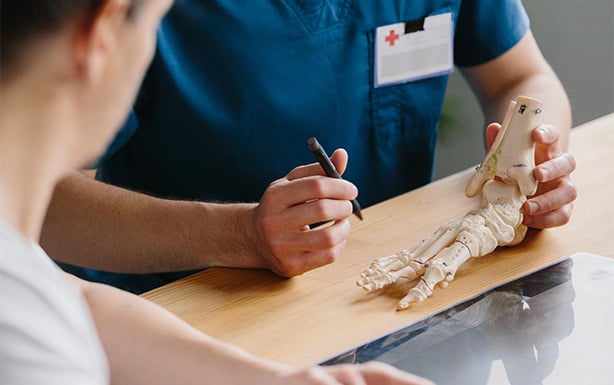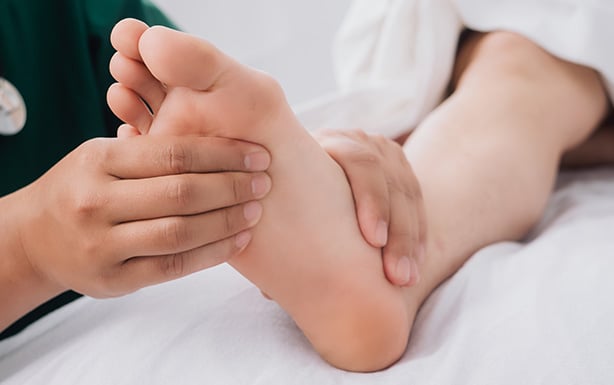-banner.jpg?width=1156&height=650&name=Neuropathy%20(T2)-banner.jpg)
Surgical Treatment for Neuropathy in Florida: Restore Sensation and Mobility
-banner.jpg?width=1156&height=650&name=Neuropathy%20(T2)-banner.jpg)
What Causes Neuropathy?
Neuropathy develops when nerves outside the brain and spinal cord become damaged or dysfunctional—often resulting in burning, tingling, numbness, or muscle weakness, most commonly in the hands and feet. It can affect a single nerve (mononeuropathy) or multiple nerves (polyneuropathy), and symptoms frequently progress over time. Although diabetes is the most common cause, neuropathy may also stem from chemotherapy, trauma, repetitive stress, prior surgeries, or no identifiable cause at all (idiopathic neuropathy).
In many cases, trapped nerves in tight areas of the body make neuropathy symptoms worse. When that happens, surgery to relieve the pressure can provide lasting relief—especially when other treatments haven’t worked.

Check Your Symptoms: Are You Experiencing Any of the Following?
- Numbness or tingling in your hands, arms, feet, or legs
- Burning pain that worsens at night
- Muscle weakness or trouble with grip, balance, or walking
- Hands or feet that feel cold, even when warm to the touch
- Difficulty buttoning clothes, picking up objects, or lifting your foot
- Ulcers, wounds, or pressure sores that don’t heal
- Reduced sensitivity to temperature, texture, or touch
If you said yes to any of the above, you may be a candidate for nerve decompression surgery.
What is Nerve Decompression for Neuropathy Relief?
Nerve decompression is a proven, evidence-based approach to neuropathy treatment, supported by decades of clinical data. In fact, studies show that up to 90% of qualified patients experience meaningful, lasting improvements in pain, sensation, and mobility following surgery.
Find Out If You’re Eligible for Nerve Decompression Surgery in Florida
See How We’re Changing Lives, One Patient at a Time
What Are the Benefits of Nerve Decompression for Neuropathy?
Am I a Candidate for Surgery?
Not all neuropathy is caused by compression—but if your symptoms are linked to trapped nerves, surgical decompression may help where other treatments haven't.
You may be a candidate if you have:
- Diabetic neuropathy with focal symptoms (burning, tingling, numbness)
- Positive findings on Tinel’s sign, EMG, or PSSD
- Numbness, pain, or weakness that interferes with walking or balance
- Persistent symptoms despite medications or wound care
- Idiopathic or post-traumatic neuropathy with localized nerve entrapment


Why is Neuropathy Often Misdiagnosed?
Neuropathy is often misdiagnosed (or overlooked entirely) because its symptoms can mimic other conditions, such as plantar fasciitis or sciatica, and early treatments like medication or physical therapy don’t always address the root cause. Many providers do their best with the tools available, but without specialized testing and expertise in nerve anatomy, compression-related neuropathy can go undetected. The Institute of Florida focuses on identifying these often-missed causes—giving patients new answers and referring providers a trusted partner for advanced evaluation and surgical care.

Considering Nerve Decompression for Neuropathy? What to Expect:
Precision Diagnostics
Before recommending surgery, we use a combination of tools—such as physical exams, nerve conduction studies (EMG), pressure-specified sensory testing (PSSD), and imaging—to pinpoint where your nerves may be compressed. We only move forward with decompression when there’s clear evidence of entrapment, so you get the right treatment, not just another guess.Tailored Surgery
Peripheral nerve decompression is performed under high-powered magnification using microsurgical tools that allow your surgeon to carefully release the nerve at known compression sites—like the tarsal tunnel, fibular neck, or peroneal groove. We monitor nerve function in real time to ensure accuracy and avoid damage to surrounding structures. Every procedure is customized to your anatomy and symptoms, with the goal of long-term relief.Rapid Recovery
Most patients go home the same day and begin light walking within a few days. Compared to more invasive surgeries, decompression typically involves minimal downtime and low risk, with many patients noticing improved sensation, balance, or pain levels within the first few weeks.Why Trust The Institute of Florida?

One of the Few U.S. Centers Specializing in Surgical Treatment for Compression-Related Neuropathy
The Institute is a national referral destination for patients with burning, numbness, and weakness caused by nerve compression. Our team performs one of the highest volumes of nerve decompression procedures in the country—bringing together deep diagnostic insight and microsurgical expertise to treat neuropathy at the source.
Surgical Expertise That Begins With the Nerve
Unlike general neurology or pain clinics, our program is built around the peripheral nerve itself. Our surgeons are fellowship-trained in advanced nerve decompression techniques and have performed hundreds of procedures to treat neuropathy caused by entrapment or injury—restoring function and sensation where others may see only symptoms.
Technology Designed for Precision Nerve Surgery
We use high-magnification surgical optics, intraoperative nerve monitoring, and delicate microsurgical instruments to decompress nerves at known anatomical pinch points—such as the tarsal tunnel, fibular neck, and peroneal groove—while protecting surrounding tissue and promoting long-term recovery.
Up to 90% of Patients Report Lasting Relief
In patients with compression-related neuropathy, studies show that up to 90% experience meaningful improvements in pain, sensation, and function after nerve decompression—often after years of frustrating, ineffective treatments.
Meet Florida’s Top
Nerve Surgery Experts

Plastic & Reconstructive Surgeon
Board Certified in Plastic Surgery
Still Struggling With Numbness or Tingling? Let’s Fix That.
If you’re living with unresolved neuropathy—or treating a patient who is—our team is here to help. With advanced surgical expertise and proven results, we offer real hope for lasting relief.
Now seeing patients in Ft. Lauderdale and Boynton Beach.
FAQs
As with any surgery, there are risks—including infection, bleeding, or nerve irritation. However, when performed by experienced nerve specialists, decompression is a low-complication outpatient procedure. We use microsurgical techniques and real-time nerve monitoring to maximize safety and precision.
Yes. Many patients try medications, physical therapy, orthotics, or topical treatments first. But if your symptoms persist—and diagnostic testing shows nerve compression—surgery may be the only way to relieve the pressure and restore function.
Common signs include numbness, tingling, burning pain, or weakness in the hands, arms, feet, or legs. Diagnosis is typically confirmed through a physical exam, nerve testing (EMG, PSSD), and medical history. We offer comprehensive evaluations to determine if your symptoms are related to nerve compression.
If symptoms are constant, worsening, or interfering with your daily life—it’s time to get evaluated. Nerve compression can worsen over time, and early intervention can help prevent permanent damage or complications like falls or foot ulcers.

%20(1).jpg?width=800&height=450&name=maxresdefault%20(2)%20(1).jpg)


.webp)


